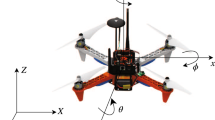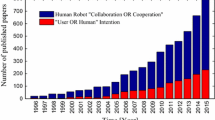Abstract
The current trends in the robotics field have led to the development of large-scale multiple robot systems, and they are deployed for complex missions. The robots in the system can communicate and interact with each other for resource sharing and task processing. Many of such systems fail despite the availability of necessary resources. The major reason for this is their poor coordination mechanism. Task planning, which involves task decomposition and task allocation, is paramount in the design of coordination and cooperation strategies of multiple robot systems. Task allocation mechanism allocates the task in a mission to the robots by maximizing the overall expected performance, and thereby reducing the total allocation cost for the team. In this paper, we formulate a heuristic search-based task allocation algorithm for the task processing in heterogeneous multiple robot system, by maximizing the efficiency in terms of both communication and processing cost. We assume a set of decomposed tasks of a mission, which needs to be allocated to the robots. The near-optimal allocation schemes are found using the proposed peer structure algorithm for the given problem, where the number of the tasks is more than the robots present in the system. The cost function is the summation of static overhead cost of robots, assignment cost, and the communication cost between the dependent tasks, if they are assigned to different robots. Experiments are performed to verify the effectiveness of the algorithm by comparing it with the existing methods in terms of computational time and quality of solution. The experimental results show that the proposed algorithm performs the best under different problem scales. This proves that the algorithm can be scaled for larger system and it can work for dynamic multiple robot system.


















Similar content being viewed by others
References
Zlot R, Stentz A (2005) Complex task allocation for multiple robots. In: Proceedings of IEEE International Conference on Robotics and Automation, pp 1515–1522
Atay N, Bayazit B (2006) Mixed-integer linear programming solution to multi-robot task allocation problem. Technical Report, Department of Computer Science and Engineering, Washington University, WUCSE-54
Bertsekas DP (1992) The auction algorithm for assignment and other network flow problems: a tutorial introduction. Comput Optim Appl 1(1):7–66
Dias MB, Stentz A (2001) A market-based approach to multi-robot coordination, Robotics Institute, Carnegie Mellon University, Pittsburgh, PA, Tech. Rep. CMU-RI-TR-01-26
Han Y, Li D, Chen J, Li J, Yang X, Hu Y, Zhang G (2010) A multirobots task allocation algorithm based on relevance and ability with group collaboration. Int J Intell Eng Syst 3(2):33–41
Dias MB, Zlot R, Kalra N, Stentz A (2006) Market-based multirobot coordination: a survey and analysis. Proc IEEE 94(7):1257–1270
Tang F (2005) Automated synthesis of multi-robot task solution through software reconfiguration. In: Proceedings of IEEE international conference on robotics and automation, Barcelona, Spain, pp 1501–1508
Botelho S, Alami R (1999) M+: a scheme for multi-robot cooperation through negotiated task allocation and achievement. In: Proceedings of IEEE International Conference on Robotics and Automation, Detroit, Michigan, pp 1234–1239
Parker LE (1998) ALLIANCE: an architecture for fault tolerant multi-robot cooperation. IEEE Trans Robot Autom 14(2):220–240
Werger BB, Matari MJ (2001) Broadcast of local eligibility for multi-target observation. In: Parker LE, Bekey G, Barhen J (eds) Distributed autonomous robotic systems. Springer, Berlin, pp 347–356
Tang F, Parker LE (2005) ASyMTRe: automated synthesis of multi-robot task solutions through software reconfiguration. In: Proceedings of IEEE international conference on robotics and automation, Barcelona, Spain, pp 1501–1508
Gerkey BP, Mataric MJ (2002) Sold!: auction methods for multi-robot control. IEEE Trans Robot Autom (Special Issue on Multi-Robot Systems) 18(5):758–768
Atay N, Bayazit B (2006) Mixed-integer linear programming solution to multi-robot task allocation problem, Tech. Rep. WUCSE-2006-54, Washington University, St. Louis, Mo, USA
Darrah MA, Niland WM, Stolarik BM (2005) Multiple UAV dynamic task allocation using mixed integer linear programming in a SEAD mission. In: InfoTech at Aerospace: advancing contemporary aerospace technologies and their integration, American Institute of Aeronautics and Astronautics, pp 2324–2334
Mosteo AR, Montano L (2006) Simulated annealing for multirobot hierarchical task allocation with flexible constraints and objective functions. In: Proceedings of the workshop on network robot systems, toward intelligent robotic systems integrated with environments
Jones EG, Dias MB, Stentz A (2011) Time-extended multirobot coordination for domains with intra-path constraints. Auton Robots 30(1):41–56
Ding Y, He Y, Jiang J (2003) Multi-robot cooperation method based on the ant algorithm: In: Proceedings of the IEEE Swarm Intelligence Symposium (SIS ’03), pp 14–18
Kmiecik W, Wojcikowski M, Koszalka L, Kasprzak A (2001) Task allocation in mesh connected processors with local search meta-heuristic algorithms. In: Intelligent information and database systems, pp 215–224
Brunet L (2008) Consensus-based auctions for decentralized task assignment. Master thesis, Massachusetts Institute of Technology
Thareswari N, Asokan T (2012) An improved algorithm for constrained multirobot task allocation in cooperative robot tasks. Lect Notes Electr Eng 107:455–466
Andersson M, Sandholm T (2000) Contract type sequencing for reallocative negotiation. In: Proceedings of the 20th International Conference on Distributed Computing Systems (ICDCS 2000), IEEE Computer Society, pp 54–160
Author information
Authors and Affiliations
Corresponding author
Rights and permissions
About this article
Cite this article
Nagarajan, T., Thondiyath, A. An algorithm for cooperative task allocation in scalable, constrained multiple robot systems. Intel Serv Robotics 7, 221–233 (2014). https://doi.org/10.1007/s11370-014-0154-x
Received:
Accepted:
Published:
Issue Date:
DOI: https://doi.org/10.1007/s11370-014-0154-x




